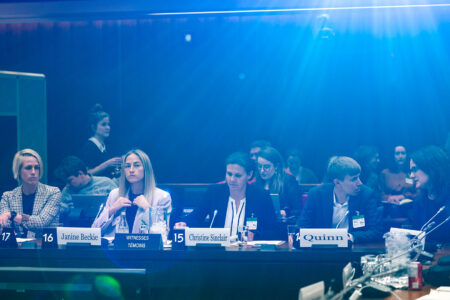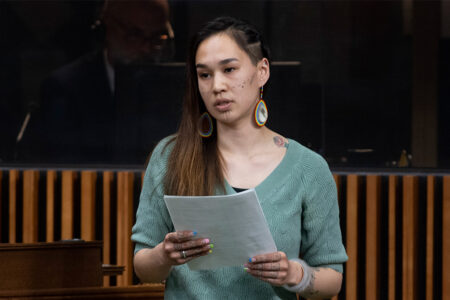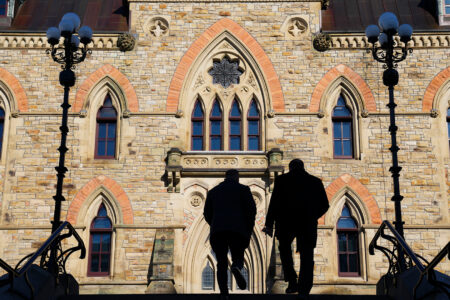
As we make our way through the 2019 election, there’s widespread anticipation that the campaign will be marked by a combination of personality, negativity and identity politics. Policy differences will be minimized and faux disagreements will be accentuated. Voters will be asked to choose based mostly on caricatures of the various political parties and their policy programmes.
It’s part of a broader and longer trend of the shrinking of politics in our societies. The adjudication of big public tensions – such as freedom and equality – can too frequently be replaced by manufactured differences and a common smallness. The result is a negative feedback loop of diminished public trust and empty partisanship that obscures ideological conformity and depoliticizes key public questions.
Breaking this cycle is critical to sustaining public confidence in our political institutions and to confronting the big questions facing the country. The solution is a restoration of politics, properly understood.
Democratic politics is ultimately the mechanism that we use to harness and reconcile competing points of view on public questions in our pluralistic societies. It should be a crowded, complicated and regularly contentious marketplace of ideas. That is healthy. But it’s unhealthy when we elevate the place of contention and de-emphasize the role of ideas.
One manifestation of the current diminishment of politics is our tendency to refrain from expressing real disagreements on important issues such as the role of government in the economy or immigration or abortion and instead overemphasize superficial disagreements on symbolic issues that galvanize donors and base voters.
The best (or worst) example of this might be south of the border. Consider the dissonance between the hyper-partisan atmosphere in Washington and the bi-partisan consensus in favour of large-scale budgetary deficits and debt accumulation. Congress is instantaneously consumed by division on meaningless issues and in utter agreement that the federal government should systematically spend more than it can afford and not concern itself with the fiscal consequences. The histrionics and politicians’ real-life practice seem to be in inverse proportion.
Canadian politics can be marked by a similar gap between our perceived and real political differences. Oftentimes our political commonalities are positive. It’s good, for instance, that our major political parties broadly agree on a role for government to provide support to families with children. But other times it can appear as a collective effort by the dominant voices to “depoliticize” issues or points of view from the public debate.
Another manifestation is the technocratization of political decision-making that aims to outsource political accountability to an unelected bureaucracy. A series of legal and institutional reforms have sought to separate politicians from the hard choices inherent in pluralistic societies. This is widely viewed in public policy circles as a felicitous outcome. There are countless examples of this impulse in practice – ranging from industry calls for a royal commission on taxation to Bill C-69, which weakens the “public interest” considerations available to our elected officials. The presumption is that politics is something that must be minimized and managed. Our leaders have even occasionally expressed approbation for China’s “basic dictatorship.”
This technocrat push neglects the extent to which public choices are rooted in normative questions. What issues we choose to care about, how we come down on different trade-offs, and even how we interpret data and evidence is ultimately shaped by our values, preferences and predispositions. Technocrats might be able to tell us the marginal efficiency of different forms of taxation, but they cannot tell us what the right level of redistribution is or whether the unit of taxation should be the individual or the family. Only politics can help us make these judgments.
These trends are regrettable because they suppress real and legitimate tensions in our pluralistic society, and they misunderstand the role of politics in grappling with them. As our society becomes more diverse and complex, the truth is we need politics more than ever.
The Death of Politics
A new book by American conservative writer Peter Wehner is a powerful rejoinder to the trends described above. The Death of Politics is a call for a renewed commitment to politics in our societies. It’s a timely contribution to our understanding of the role and place of politics.
Wehner describes politics as a “noble calling” that’s been eroded by the “politics of contempt,” unresponsive to the concerns of large swathes of citizens and unrooted from a higher purpose. Polarization and distrust are the symptoms. A systemic lack of civility, discernment and moderation are the causes.
He doesn’t lay the blame just on the political class, however. He attributes a share of the responsibility to the general public for its lack of civic engagement and affirmation of some of the worst excesses of the political status quo. He’s essentially saying that we get the politics that we deserve. It’s a risky diagnosis for someone aiming to sell books. But that doesn’t make it less accurate.
Canadian readers shouldn’t be too quick to judge, either. Similar criticism applies to us as well. We’ve too readily come to view politics as a primarily transactional exercise. Voters and politicians have become the key players in a self-reinforcing competition to dedicate scarce public resources to different client groups. The media have exacerbated this trend by evaluating every policy announcement based on a superficial lens of who wins and who loses.
This is how we end up with competing Conservative tax credits for hockey moms and Liberal tax credits for public school teachers. It’s as if everyone in the system recognizes that such clientelism is cynical and counterproductive but no one knows how to stop it. Politicians, voters and the media are stuck in a vicious cycle.
Wehner’s solution is a restoration of politics. He isn’t using politics as a synonym for poll-tested electioneering. His point is that only politics can aspire to reconcile the multiplication of competing definitions of the “public interest” and the “public good” present in a pluralistic society. This work is unceasing and never satisfactory to everyone, of course, but the alternative is invariably worse. As he puts it:
“The task of politics is to live peaceably with our differences and for people to find appropriate outlets for their views to be heard and represented. A healthy politics has as its goal not a civic nirvana where we all just get along, but a nation with enough sense of unity and common purpose to accept and overcome our differences – and where deep differences do exist, to debate them with words rather than fists or billy clubs or bullets, in ways that are characterized by intellectual rather than physical conflict.”
It’s a call to ask more of our politics. Our societies face big and complicated challenges. How can we reconcile the rise of globalization with demands for national expression? How do we balance the interests of the goods-producing economy with one increasingly rooted in intangible assets? How do we protect against a sharp bifurcation of opportunity and experience between those in urban and rural places? How do we manage the tensions between economic dynamism and financial security? And how we do find compromise between cultural progressivism and traditional perspectives?
The answers to such questions aren’t obvious. The risk is that ill-conceived responses pull us further apart. Only politics can be expected to confront these questions with any legitimacy. But this requires that our politics (and our politicians) are up to the challenge to navigate the myriad of complex cultural, economic, moral, and social questions that are on the horizon.
The main ingredient, according to Wehner, is moderation. This shouldn’t be confused as mere squishy centrism. He isn’t arguing for a Solomonian program of simply “cutting the baby in half.” Instead, his point is that politics should be rooted in what Friedrich Hayek called “epistemic humility.” As Wehner writes:
“Moderation accepts the complexity of life in this world and distrusts utopian visions and simple solutions. The way to think about moderation is as a disposition, not as an ideology. Its antithesis is not conviction but intemperance.”
It’s a vision and message that seems out of step with the inflamed politics of the moment. But it’s needed now more than ever. The vexing questions of our era (including the ones listed above) rarely lend themselves to absolutism. This is, as David Brooks has observed, ultimately about a competition of partial truths. Think of freedom and equality, or dynamism and security, or liberty and virtue. Reconciling these competing goods requires moderation. And it requires politics.
Digital Democracy Project
But the restoration of politics that Wehner envisions also requires that we protect our political systems from external pollutants. External acts of disinformation, including the use of bots and other digital media tools, pollute our political environment and impede our ability to make collective judgments about normative questions. Facebook, Twitter and other online platforms have lowered the threshold for Russia, China and others to disrupt election campaigns or engage in manufactured issue-based campaigns at a minimal cost. Growing evidence of these hostile cyber campaigns is therefore a threat to the proper functioning of our politics.
Yet, while the evidence is clear, the politicization of Russian interference in the 2016 US presidential election has brought our democratic resiliency into question. The magnitude of the problem and the right institutional and policy responses have been clouded by partisan interests. This is a mistake. No matter our differences, we ought to agree that our politics must be protected from foreign interference and other malicious actors. Failing to do so actually harms our capacity to effectively disagree in the public arena.
Think of it this way. George Will recently described “politics as the art of accommodating differences in societies open to disagreements about the proper ends of a worthy life.” His formulation is correct, but it assumes that the sources of our animating disagreements come from within our own societies. Politics cannot play the role that Will or Wehner envision if our disagreements falsely derive from external actors with malicious intent or if fringe voices are amplified by algorithms rather than real public support.
What can we do about these challenges? How can we ensure that our politics are focused on Canadian voices and Canadian issues in a cyber era?
We must work together to develop mechanisms to identify and isolate malicious actors and disinformation to protect our democracy and our politics. These efforts don’t necessarily require heavy-handed regulation or state-centric responses. Civil society can play a constructive role.
The Digital Democracy project, led by the Public Policy Forum and McGill University, is one example of a civil society effort to develop such capacity. It’s still a work-in-progress. But its plans for digital media monitoring can help us better understand the origins, reach and impact of disinformation campaigns during the upcoming federal election. A final report in March 2020 should help to inform readiness preparations and possible legal or policy changes for subsequent elections.
Some conservatives may have reservations about these types of activities. There’s a real concern that “disinformation” becomes an expansive net that captures any ideas or speech that diverges from left-wing orthodoxy. Opposition to carbon taxes or current immigration levels or the legal status quo on abortion risks being painted as false or malicious or worse.
But these efforts to identify and isolate disinformation cannot be about challenging the place of normative differences in our politics. Quite the opposite. Their goal must be to protect the civic space precisely so our normative differences can be expressed, litigated and reconciled through the political process. This can only work if our political debates are a true reflection of the views and priorities of our citizens. The same principle applies incidentally to decision-making around the development of our natural resources and the need to ensure that the regulatory process isn’t gamed by foreign interests who seek to landlock Canadian oil and gas for their own economic or geopolitical ends.
Conservatives should therefore be prepared to work with any organizations of good will to identify and isolate disinformation and better protect our politics. Failing to participate in these efforts because of ideological suspicions won’t make them better. It will invariably make them worse. It’s much more productive to actively contribute and ultimately ensure that our political space is open to big, normative disagreements. Our growing diversity and rising cultural, economic, moral, and social challenges make this imperative.
Many conservatives are familiar with Charles Krauthammer’s famous observation that “politics is sovereign in human affairs.” His point was that we cannot take the art of politics for granted. It’s foundational. Everything else rests upon it. We must therefore get it right.
It’s a reminder that we ought to aspire to a better, more endeavouring and ultimately moderate politics. The first step could be to read Peter Wehner’s new book. The second is to cross the ideological and political divide to target disinformation. Only then will we see public trust restored and our politics ready to face the challenges of the future.
Photo: Shutterstock, by Lightspring
Do you have something to say about the article you just read? Be part of the Policy Options discussion, and send in your own submission. Here is a link on how to do it. | Souhaitez-vous réagir à cet article ? Joignez-vous aux débats d’Options politiques et soumettez-nous votre texte en suivant ces directives.






